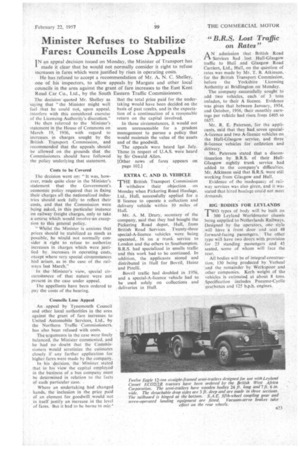Minister Refuses to Stabilize Fares: Councils Lose Appeals
Page 27

If you've noticed an error in this article please click here to report it so we can fix it.
IN an appeal decision issued on Monday, the Minister of Transport has I made it clear that he would not normally consider it right to refuse increases in fares which were justified by rises in operating costs.
He has refused to accept a recommendation of Mr. A, N. C. Shelley, one of his inspectors, to allow appeals by Margate and other local councils in the area against the grant of fare increases to the East Kent Road Car Co., Ltd., by the South Eastern Traffic CommiSsioners.
The decision quoted Mr. Shelley as saying that "the Minister might well feel that he could not, upon appeal. interfere with this considered exercise of the Licensing Authority's discretion."
He then referred to the Minister's statement in the House of Commons on March 19, 1956, with regard to increases, in charges sought by the British Transport Commission, and recommended that the appeals should be allowed on the grounds that the Commissioners should have followed the policy underlying that statement.
Costs to be Covered
The decision went on: "It. was, however, made quite clear in the Minister's statement that the Government's economic policy required that in fixing their charges all the nationalized industries should seek fully to reflect their costs, and that the Commission were • being asked, in this particular instance on railway freight charges, only to take a course which would involve-an exception to this general policy.
"Whilst the Minister is anxious that prices should be stabilized as much as possible, he Would not normally consider it right to refuse to authorize increases in charges which were justified by increases in operating costs, except where very special circumstances had arisen, as in the ease of the railways last March."
In the Minister's view, special circumstances of that nature were not present in the case under appeal.
The appellants have been ordered to pay the costs of the hearing.
Councils Lose Appeal
An appeal by Tynemouth Council and other local authorities in the area against the grant of fare increases to United Automobile Services, Ltd., by the Northern Traffic Commissioners. has also been refused with costs.
The virguments in the case were finely balanced, the Minister commented, and he had no doubt that the Commissioners would scrutinize the estimates closely if any further application for higher fares were made by the company.
In his decision, the Minister stated that in his view the capital employed in the business of a bus company must be determined in relation to the facts of each particular case.
Where an undertaking had changed hands, the inclusion in the price paid of an element for goodwill would not in itself justify an increase in the level of fares. But it had to be borne in mM ' that the total price paid for the undertaking would have been decided on the basis of past results, and in the expectation of a continuation of a reasonable return on the capital involved.
In 'those circumstances, it would not seem unreasonable for a prudent management to pursue a policy that would maintain the value of the assets and of the goodwill.
The appeals were heard last July. Those in respect of U.A.S. were heard by Sir Oswald Allen.
[Other news of fares appears on page 102.] EXTRA C. AND D. VEHICLE
THE British Transport Commission
withdrew their objection on Monday when Pickering Road Haulage, Ltd., Hull, successfully applied for a B licence to operate a collection and delivery vehicle within 10 miles of H Mr. A. M. Drury, secretary of the company, said that they had bought the Pickering Road depot, Hull, from British Road Services. Twenty-three special-A-licence vehicles were being operated, 16 on a trunk service to London and the others to Southampton. B.R.S. had specialized in smalls traffic and this work had to be continued. In addition, the applicants stored and distributed in Hull for Bovril, Ileinz and Pirelli.
Bovril traffic had doubled in 1956, and a special-A-licence vehicle had to be used solely on collections and deliveries in Hull.
























































































